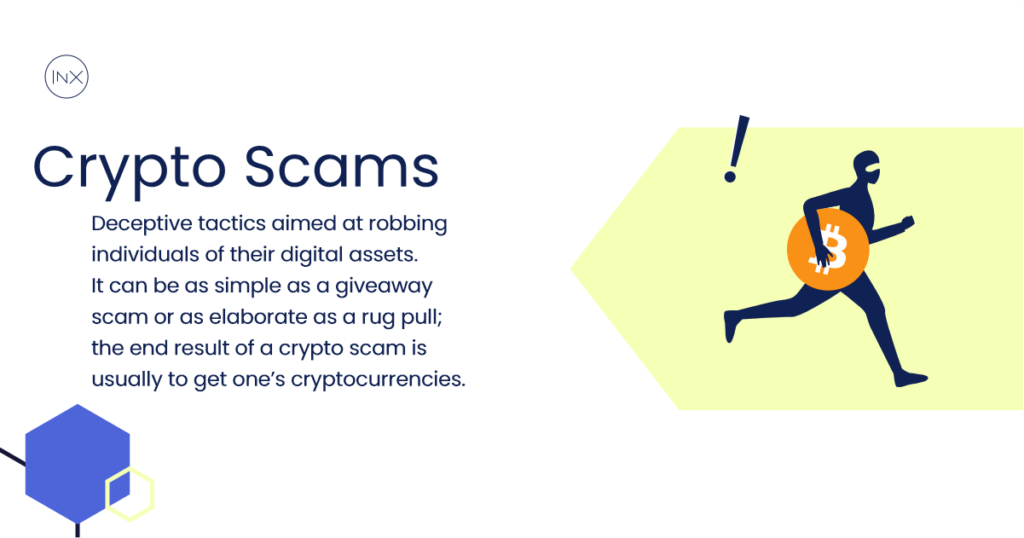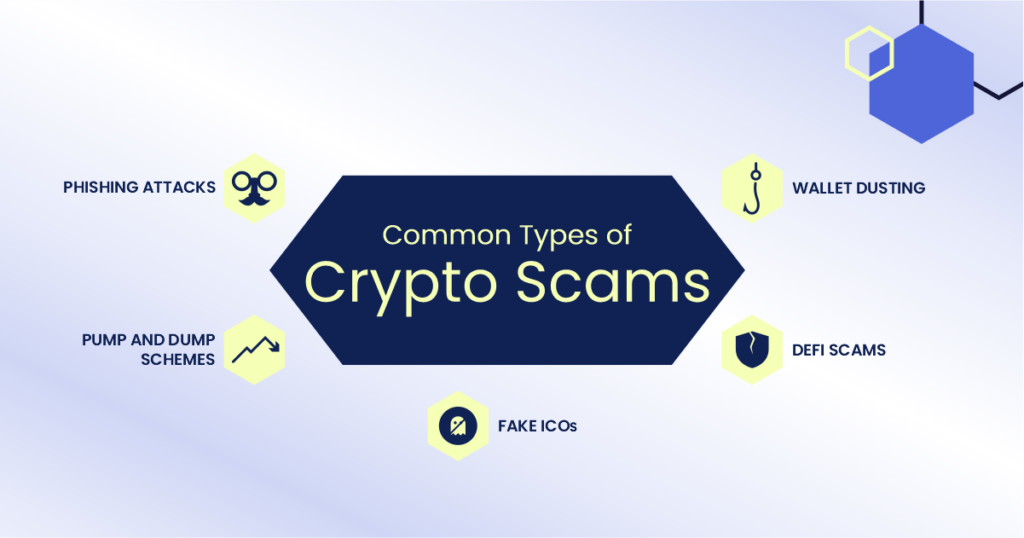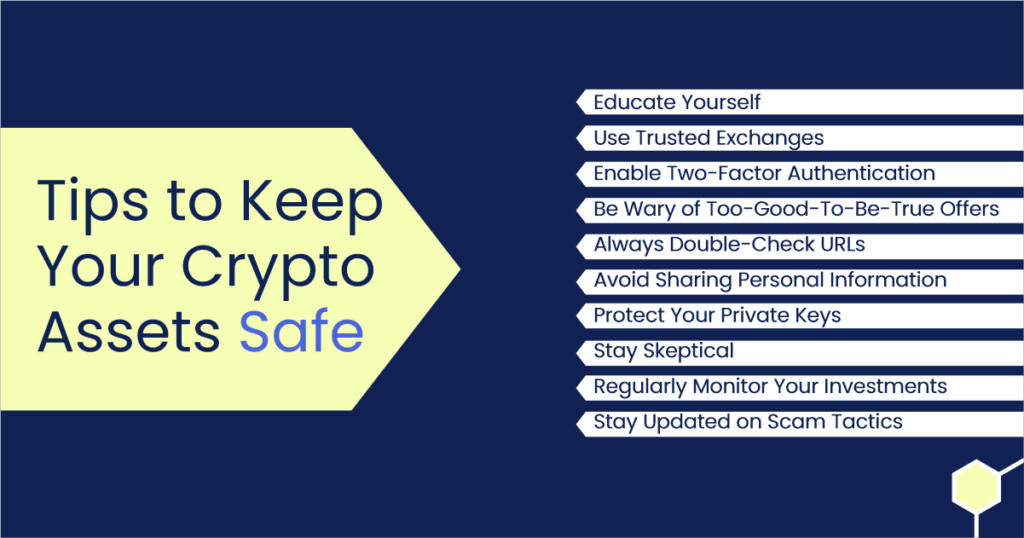How To Avoid Crypto Scams: 10 Tips to Help Keep Your Crypto Assets Safe

Cryptocurrencies have gained traction recently, and the crypto revolution is in full swing. Unfortunately, with its decentralized charm and promise of financial freedom, the crypto space has also become a playground for scammers.
For every genuine opportunity, there’s a shadow lurking, ready to capitalize on the FOMO (Fear of Missing Out) of both seasoned crypto traders and enthusiastic newcomers. This article covers these common crypto scams, how to avoid crypto scams, and how to protect your assets.
What are Crypto Scams?
At its core, a crypto scam is a deceptive tactic aimed at robbing individuals of their digital assets. It can be as simple as a giveaway scam or as elaborate as a rug pull; a crypto scam usually aims to get one’s cryptocurrencies.

The crypto world’s decentralized and often unregulated nature makes it a fertile ground for scams. The allure of quick, outsized profits can often blind individuals, making them susceptible to such scams.
It’s essential to understand that while the blockchain technology behind cryptocurrencies is secure, human errors and greed create vulnerabilities. Scammers often exploit these vulnerabilities to rob unsuspecting victims of their assets. These scams often come in different ways; in the next section, we cover the common crypto scams.
Common Types of Crypto Scams
Crypto scams can generally be classified into two groups:
- Scammer gaining access into crypto wallet and transferring assets directly out of the wallet
- Tricking victims into transferring their crypto assets to malicious actors
But as mentioned earlier, crypto scams come in many forms and can vary from simple to elaborate technical scams. Below are the common types of crypto scams and how they work.
Phishing Attacks
A phishing attack is usually a scam where scammers impersonate legitimate entities to steal sensitive information. They might mimic a popular crypto exchange or wallet provider, tricking users into providing private keys or login credentials.
Phishing attacks can be:
- Email phishing – The victim gets a phishing email requesting their keys/log-in details. The email might also contain a link that leads to a phishing website.
- Website phishing: In this case, scammers target users with decentralized wallets like Metamask. They often send a wrong error message asking the user to reconfirm.
- Google ads: Scammers can put up ads that lead to the wrong website with the aim of getting users to input their wallet details.

Pump and Dump Schemes
Here, organized groups artificially inflate the price of a cryptocurrency to attract unsuspecting investors. Once the price is pumped, they sell off their holdings, causing the price to plummet.
Pump and dump coins are usually worthless penny stocks, sometimes meme coins with no unique use case. In this case, the scammers drive the coin’s price with excessive marketing tactics or “shilling” on various social channels.
Fake ICOs
Initial Coin Offerings (ICOs) are ways for new projects to raise capital and have become increasingly popular. With fake ICOs, though, Scammers create the ICOs with the sole intention of running away with investors’ money once they’ve accumulated enough. They lure investors with the promise of high returns, only to disappear once they’ve collected enough money.
DeFi Scams
The decentralized finance (DeFi) space, though revolutionary, is also rife with scams. One notable DeFi scam is the “rug pull,” where developers abandon a project after raising funds, leaving investors with worthless tokens.
Another notable scam is the “honey pot,” which is a bit like the pump and dump. The developers lure investors with hefty price predictions, but as the price increases, investors discover that they cannot withdraw. This is mostly due to a back door in the smart contract that allows only the scammers to withdraw from the pool or project.
Social Media Scams
Scam accounts impersonate celebrities and influencers accounts on social media platforms to convince victims to send crypto to the scammer’s wallet. They can also create fake giveaways and ask people to pay before accessing these giveaways.
Telegram scams
In Telegram scams, scammers impersonate execs from crypto companies on Telegram and try to trick unsuspecting people into sending crypto to them. In some cases, the scammers impersonate employees of the victim’s company.
Wallet Dusting
In this case, scammers send tiny amounts of cryptocurrency to wallets, which can then be used to track transactions and potentially identify individuals for targeted attacks. Wallet dusting is usually combined with phishing attacks.
Airdrop Scams
With this crypto scam, the malicious actors promise free tokens in exchange for small tasks. Once users participate, they might be asked to provide private information or even make a payment. In some cases, the scam will require victims to connect their wallets to the phishing website, giving the scammer access to their wallets.
Tips to Help Keep Your Crypto Assets Safe
The following tips can help you avoid crypto scams and protect your assets.
- Educate Yourself: The crypto space is evolving rapidly. Stay updated with the latest trends, technologies, and potential threats. Familiarize yourself with crypto-native terms like FOMO (Fear of Missing Out) and DYOR (Do Your Own Research).
- Use Trusted Exchanges: Always use reputable platforms with a proven track record like INX. Research any platform before committing funds and ensure they are regulated and insured.
- Enable Two-Factor Authentication: This provides an additional layer of security, ensuring your account remains secure even if your password is compromised.
Be Wary of “Too-Good-To-Be-True” Offers: High returns in a short time? Unsolicited investment advice? These are red flags. If it sounds too good to be true, it probably is.

- Always Double-Check URLs: Many phishing sites mimic legitimate sites. Always ensure you’re on the correct website, especially before entering any sensitive information.
- Avoid Sharing Personal Information: The less information you share online, the harder it is for scammers to target you. This includes not flaunting crypto holdings on social media.
- Protect Your Private Keys: Your private keys are the gateway to your crypto assets. Never share them, store them offline, and consider using hardware wallets for added security.
- Use Hardware Wallets: For substantial crypto holdings, consider using a hardware wallet. These devices store your private keys offline, ensuring they’re safe from online breaches.
- Stay Skeptical: Approach new crypto projects with caution. While not every new project is a scam, it’s essential to be critical and do thorough research. If you notice the project has excessive marketing tactics, that may be a red flag.
- Thoroughly Research Before Investing: Before investing in any crypto project, thoroughly research the project and the team. Has the project’s smart contract been audited? How credible is the team behind the project? How strong is the community?
- Regularly Monitor Your Investments: Keep an eye on your holdings, be aware of transaction histories, and ensure no unauthorized transactions occur.
- Stay Updated on Scam Tactics: As the crypto space evolves, so do scam tactics. Regularly educate yourself on the latest scams to stay one step ahead.
Conclusion
The crypto world offers immense potential for lucrative returns for investors. But with this potential comes the risk of crypto scams, and they can deceive even the most experienced crypto investors.
Therefore, staying informed, skeptical, and always prioritizing safety is essential. Keep your information private, mind the link you click on or connect to your crypto wallets. Remember, you need to keep your crypto assets safe to enjoy the full potential of cryptocurrencies.
The INX Digital Company INC August 30, 2023
The INX Digital Company inc. is an expert in the field of finance, crypto and digital securities.





